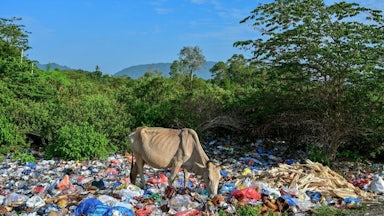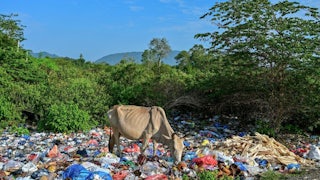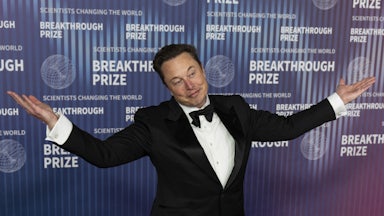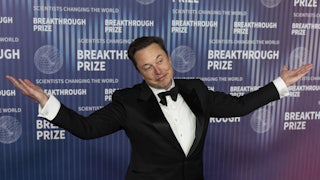Somewhere on Earth 2, President Boe Jiden, after committing to a thorough review of the groaning, creaking, top-heavy agriculture industry, has decided that the time has come to start fresh. There, the Jiden administration is setting its sights on breaking up the corporations that, during a global pandemic, forced workers back into the aptly named slaughterhouses and demanded their farm laborers work the fields while smoke from the largest wildfire in American history filled their lungs, and that, for decades, have crafted policies that incentivize the consolidation and corporatization that long ago buried the family farm.
In an address explaining how his administration plans to reshape and revitalize farming and agriculture, Jiden invokes names of rural populists of old like Marion Butler and W. Kerr Scott, saying that people of the fields—not people of the boardroom—should be the ones to determine their future. Addressing the industry’s long-standing legacy of racism, both violent and passive, Jiden solemnly reflects on the Elaine Massacre while promising finally to crack the vestiges of Jim Crow that the New Deal and subsequent federal policies cemented. He pledges to craft a financial entryway to land ownership that equitably funds Black, Latinx, and Native farmers. The president instructs stakeholders to consult with Indigenous communities, to listen and learn the best methods for long-term land and resource management and how to act as both steward and landowner. He calls for stronger labor protections among both citizen and noncitizen workers, lifting up groups like the Farm Labor Organizing Committee and praising the memory of the Southern Tenant Farmers’ Union, hoping to provide a vision of a future wherein both white and nonwhite landowners and workers are provided the necessary legal and financial safety nets to exist without constant concern of bankruptcy, harassment, or exploitation. Jiden then turns to the camera and promises federal funds to enable and normalize sustainable practices across the industry. Equitable farming will be the farming that helps bring us to net-zero emissions.
Meanwhile, here on Earth, we start our week with the Senate confirmation of Tom Vilsack.
On Tuesday, Vilsack faces his second Senate confirmation hearing in 12 years. Barring any surprises, he will once again become agriculture secretary.
It’s not difficult to understand why President Joe Biden tapped Vilsack to head the Department of Agriculture. Careerwise, Vilsack and Biden are comparable figures. They are both in their seventies, both white men, both career politicians who have managed to remain in the mix for decades by branding themselves as protectors of the working class, despite not being quite as in tune with that class as they were when they started. (Loads of cash tends to do that to a person.) As a senator, vice president, and now president, Biden has shown a consistent fondness for hiring people within arm’s reach, and nobody is closer to the USDA than the man who already ran it for eight years. Therein lies the beginning of the problem with Vilsack’s nomination.
Vilsack climbed the ranks in Iowa politics, going from Mount Pleasant mayor to state senator to governor to presidential hopeful. He finally settled on the USDA position. At least for his first run at it, though, he didn’t seem too enthusiastic about the job. In late 2015, Vilsack reportedly walked into the Oval Office and asked Obama if he could resign because he felt that the administration and private sector were too disconnected from the actual needs of rural communities and because “there are days when I have literally nothing to do,” he told The Washington Post. (At least a half-dozen times throughout the piece, Vilsack, speaking on the record, lamented holding this tax-dollar-funded job that most Americans would probably envy.)
Criticism of Vilsack in the run-up to his confirmation is grounded in three fair critiques. The first concerns his career choice the moment he and the rest of the Obama administration left the White House. The Milwaukee Journal Sentinel reported that Vilsack made just shy of a million dollars as an executive vice president at Dairy Management Inc., a position he had lined up within a month of Obama’s departure from the White House. Joining the nonprofit—which is in part funded by mandatory fees that dairy farmers are required to pay, even if their farms operate at a loss—was a questionable move at the time. In 2017, the Sentinel revealed that Dairy Management executives were raking in $8 million in farmer-funded salary while 1,600 dairy farms were forced out of business. But, again, loads of cash can change one’s perspective.
The Biden administration already has plenty of practice downplaying recent private sector work by Cabinet officials. It brushed off backlash to BlackRock alum Brian Deese’s appointment to head the National Economic Council, for instance. And last week, White House press secretary Jen Psaki was asked by a reporter whether Treasury Secretary Janet Yellen would recuse herself from future investigations into the GameStop stock situation because one of the hedge funds embroiled in the short squeeze paid her $810,000 in 2019 and 2020 for giving three talks to the company. Psaki brushed those concerns away, saying, “It shouldn’t be a surprise to anyone she was paid to give her perspective and advice before she came into office.” Expect a similar response when the questions come for Vilsack.
The second, and maybe most politically egregious, strike against Vilsack’s nomination is the fact that Ohio Congresswoman Marcia Fudge actively campaigned for the agriculture gig. Backed by the progressive wing of the party, Fudge wanted to direct and clean up the department that for the past century has helped run Black farmers out of business. A New York Times report on the issue found that the industry’s rate of Black-owned farms has dropped from 14 percent in 1920 to less than 2 percent today, helped along by patterns of racist lending practices by banks and inequitable funding by the federal government.
Fudge was tapped instead to run the Department of Housing and Urban Development, and the ag job went to Vilsack, who very publicly failed in his first stint as agriculture secretary to address the department’s culture of marginalization. (This includes Vilsack’s wrongful termination of Shirley Sherrod after he was duped by an edited Breitbart video.) The Washington Post noted in a recent reflection on Vilsack’s unfulfilled promises to Black farmers that he closed his tenure in 2016 with an email calling for “a new era of civil rights” at the USDA, making claims of a renaissance for Black farmers that were almost all proved to be either misleading or false, in reporting from outlets like The Counter. He has since signaled contrition for his shortcomings, but it’s unclear how far he’ll be willing to go to confront the issue: In a videoconference with civil rights leaders and Black farmers’ advocates, the Post reported that Vilsack stopped short of endorsing the Justice for Black Farmers Act, which would provide Black farmers land and create a USDA civil rights oversight board.
The third, and most unwieldy, existential issue that Vilsack’s nomination presents involves the USDA’s role in encouraging the industries under its purview to address climate change proactively. As with the agency’s baked-in discriminatory practices, it’s not just difficult to envision Vilsack being some grand deliverer of radical, necessary climate-focused policy—it’s difficult to imagine anyone using the current USDA in such a manner. The USDA is an operation that has long had its priorities dictated by industry leaders. And Big Ag’s leaders, much like Big Oil’s, have chosen for decades to view the issue of climate change mainly through the potential of short-term economic losses. This means they have deployed their sizable lobbying forces to oppose any legislation or policies that will temporarily affect their bottom line.
To take on such industry forces wouldn’t necessarily require a complete outsider—grasping the intricacies of the USDA as well as the needs of the communities and businesses that depend on it is what job recruiters would redundantly call a mandatory requirement. But it takes only a quick glance at the various rundowns of Vilsack’s past to understand that, whether facing the urgent need to forestall further consolidation in the livestock sector, stepping in on algae blooms caused by agrochemical runoff, or breaking with his homegrown devotion to corn ethanol, Vilsack is not exactly going to be an agent of change. Think of him more as an agent of the pre-Trump status quo. Unlike Perdue, Vilsack will hold the line against the worst of Big Ag’s attempts to control federal policy; the problem, though, is that that’s no longer enough.
We shouldn’t wholly count out the possibility of Vilsack cleaning up the anti-climate mess Trump left behind. As Ricardo Salvador, the director of the Food and Environment Program at the Union of Concerned Scientists, told InsideClimate News, “The key thing is Vilsack is not Perdue.” And it’s true: Vilsack is not Perdue! As secretary, he built up the USDA’s research wing, which included a sizable investment (roughly 22 percent of the overall research budget) in climate change policies. In the sole interview granted prior to his confirmation hearing, Vilsack told The Storm Lake Times that he believes he will have the power as secretary to use funds from both the pandemic relief bills and the USDA’s Commodity Credit Crop—effectively an agency piggy bank that the Trump administration used to wage its trade war—to tackle climate-related matters.
This is all promising, just as are his verbal commitments to addressing race-based discrimination and not letting his myriad corporate ties deter his vision for delivering a stable economy for agriculture-dependent rural communities. Vilsack is not Perdue, nor is his nomination wholly bad. But it’s not great, either. And at this critical juncture, it’s hard not to wonder why the Biden administration is asking both agriculture workers and America to settle.








